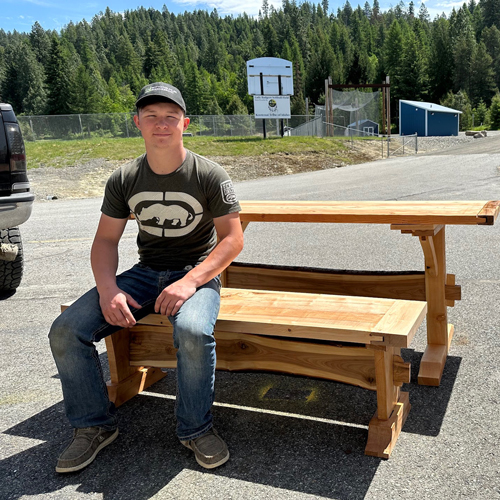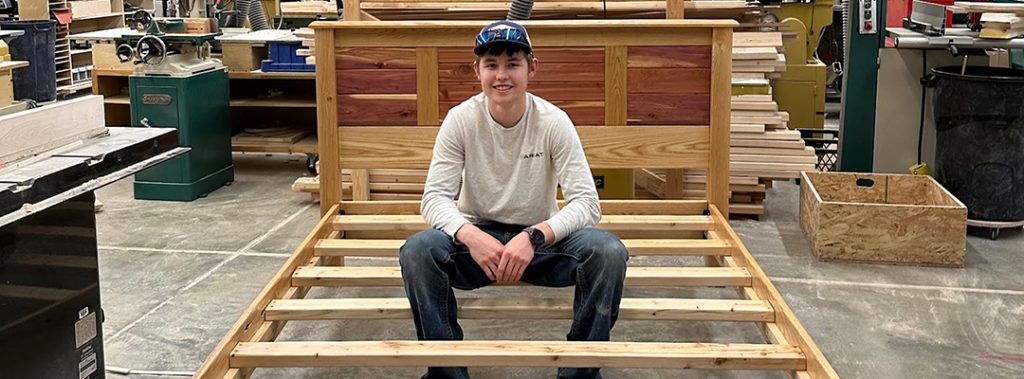Tag: woodworking
Grant transforms Bonners Ferry High School woodworking program


In 2014, Francis Carlson’s career took an unexpected turn. Though she had a certificate in fine woodworking from Selkirk College in Nelson, British Columbia, she struggled to find a job in the post-recession economy. It was then that Carlson, a 2011 Bonners Ferry High School (BFHS) graduate, discovered an opportunity to share her passion for woodworking in education.
Faced with the potential cut of the woodworking program at her alma mater due to the absence of a teacher, Carlson stepped in as a substitute teacher. Her initial reluctance turned into a genuine passion, and with enough experience on the job, she obtained a limited occupational specialist certificate and made the leap into teaching full-time.
“If we want our students to have the best education, we have to give them access to the best equipment,” Carlson affirmed. “Now I’m confident my students have that.”
Francis Carlson
Over the past nine years, Carlson has earned a bachelor’s degree in technical education and will finish a master’s degree in curriculum development from the University of Idaho. She has also become a fervent advocate for technical education and the imparting of practical employability skills.
“I’m passionate about CTE. I feel like this is where we should be directing our time, energy, and resources,” said Carlson.
Under Carlson’s guidance, the BFHS woodworking program has blossomed. Students start the program learning basics in shop safety, small tools and machines, as well as measuring and layout concepts. Students focus intensively on standards, planning, materials, drafting, and reading plans in their second year. The curriculum emphasizes lean manufacturing principles and includes techniques such as gluing and computer numerical control engraving for personalization. In their third year, students delve into the intricacies of cabinet joints, doors, and drawers, culminating in constructing cabinets for various locations at BFHS, such as classrooms, the principal’s office, and the shop toolroom. In the final year of cabinets, students dive deeper into cabinetry and fine woodworking learning advanced skills like veneering, glass etching, table construction and joints, with special emphasis on cabinet and furniture production.
Carlson actively collaborates with local employers to understand their needs, establish internships, and cultivate positive relationships with businesses. She also strives to give her students experience with industry-standard equipment so they can meet employers’ expectations on the job.
However, acquiring the necessary resources can be challenging in a small school within a small district. Though Carlson has made consistent upgrades and improvements since she began teaching, there’s one piece of equipment she hasn’t been able to replace: a dust collector originally installed in 1992. This vital component removes sawdust and woodchips, ensuring clean air and a safe work environment for students. The existing collector showed signs of wear and tear, but the financial burden of a $200,000 replacement was daunting for a small school.
Undeterred, Carlson used her grant-writing skills and applied for a Leading Idaho grant. In September 2023, she secured a $250,000 grant, not only covering the replacement of the dust collector but also upgrading the planer, drum sander, and jointer. The equipment is currently being manufactured, with the installation expected in January or February 2024.
Despite the temporary inconveniences during the installation, Carlson is optimistic about the new, more efficient equipment and how it will contribute to a dynamic and engaging educational experience. “If we want our students to have the best education, we have to give them access to the best equipment,” Carlson affirmed. “Now I’m confident my students have that.”
 Official Government Website
Official Government Website